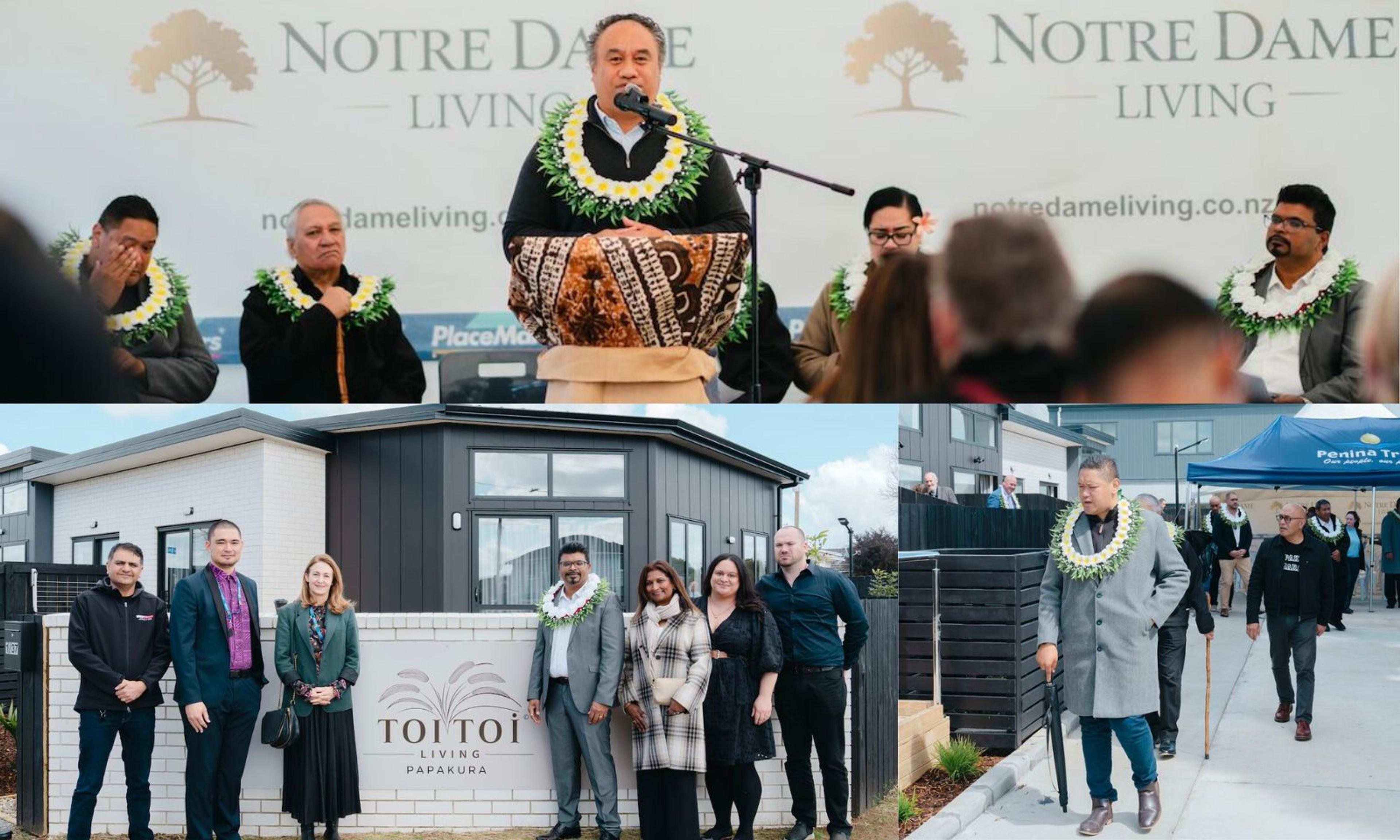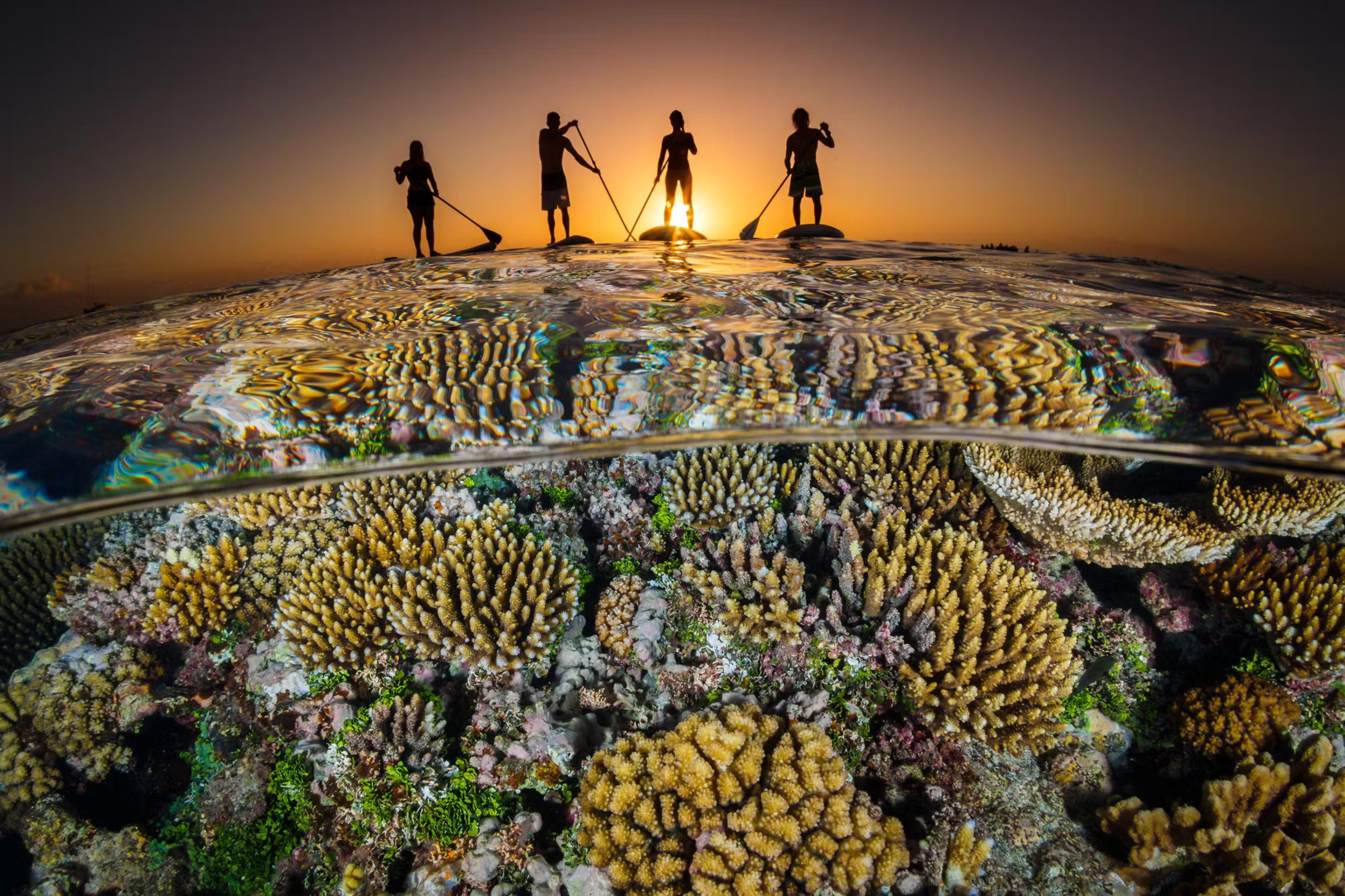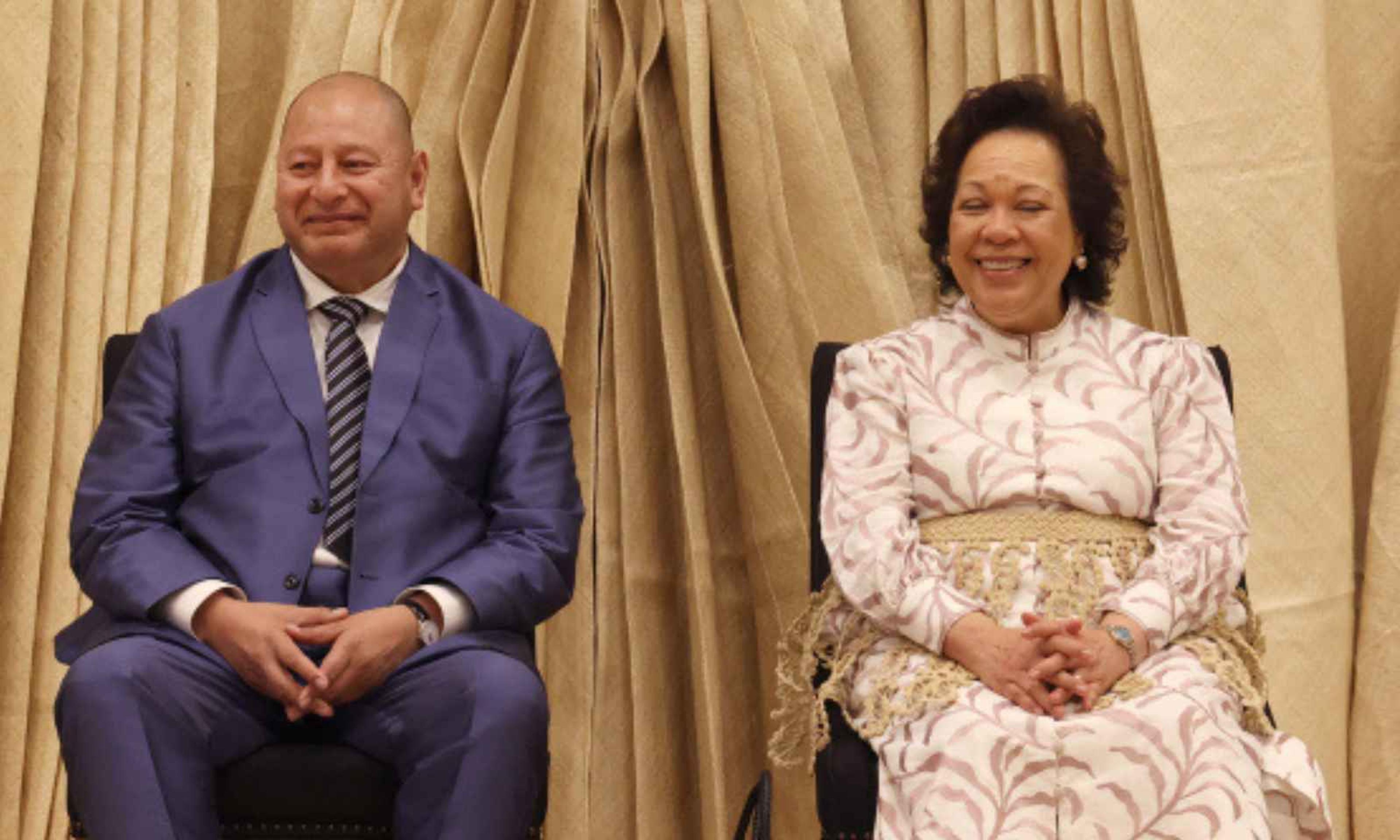

From left; Chelsea Winstanley, Gaby Solomona and Nevak Rogers speaking at the IWI conference.
Photo/ PMN News
'Who is she': Rediscovering what it means to be young, brown and female
Gaby Solomona attended the IWI conference and shares her week of inspiration and self re-education.


Historic UN High Seas Treaty approved as new era of global ocean protection begins

A Sāmoan Success: D’Angelo Leuila shares his inspiring journey

A Royal Diplomacy: Tonga’s King and Queen mark 200 years of friendship in Australia

South Auckland’s new accessible homes celebrating Pacific culture and community

Historic UN High Seas Treaty approved as new era of global ocean protection begins

A Sāmoan Success: D’Angelo Leuila shares his inspiring journey

A Royal Diplomacy: Tonga’s King and Queen mark 200 years of friendship in Australia
This article is part of series we are publishing this week focusing on indigenous women in New Zealand and the Pacific.
Who is she?
She who lacks the gagana of her Nana’s native tongue
She who is not indigenous to this land
She who is not immersed in traditional ways
She who swaps puletasis for tight and off the shoulder dresses
She who conforms to diaspora ways
She who also learnt the word diaspora from woke Gen-Z activists
She who’s story she fearfully keeps to herself
Who is she?
Last week I had the honor to attend IWI - the Indigenous Women in Industry conference held here in Aotearoa, along with over 200 indigenous women from around the globe, who hikoi-ed their way to Aotearoa.
However my malaga (journey) with IWI began a few weeks prior with a phone call from our chief executive Don Mann asking if I would like to attend the conference on behalf of our organisation PMN.
This phone call caught me off guard, as I wrestled with the idea that out of all the amazing women here at PMN, our CEO wanted to send me.
“Everyone else must be busy and I must be the last resort,” I thought to myself.
Have you ever had a similar moment? The moment where you are greeted with an amazing opportunity that suddenly gets hijacked by the uninvited lingerer of the imposter syndrome?
Imposter syndrome (IS) is a behavioral health phenomenon described as self-doubt of intellect, skills, or accomplishments among high-achieving individuals

PMN journalist Atutahi Potaka-Dewes, alongside Gaby Solomona. Photo/ Supplied
What does all of this have to do with IWI, we will get to that.
I had a thought that I would like to share, that while our ancestors navigated the seas and stars to find new lands, and while my grandparents navigated their way on the Tafua ship to the land of milk and honey. But in 2024 myself and other Pasifika of the diaspora, are navigating the (privileged) seas of imposter syndrome and the tension of growing and living on lands that are not our own.
I have always felt a deep sense of connection to the tikanga ways of Maori. Growing up as a New Zealand-born Samoan in the 90s, we were not taught about the word “indigenous”, and it was not cool to be any shade of the color brown, if you wanted to be accepted by society and participate in what we know as the “Palagi ways”.
For myself as a Samoan, that looked like being Samoan at home and Palagi everywhere else. That looked like not growing up speaking our gagana (language) and making sure we dressed in our Sunday best at church because according to my Nana that’s how you get into Heaven.
Fast forward to the present day, Sunday, 4 February, 2024, and I found myself sitting in my car parked outside the famous New Zealand chef Peter Gordon’s Homelands restaurant located in Auckland CBD.
Given my feeling of "not being Samoan enough’’, I place my Nana Faleava’s purple sei in my left ear while holding my Nana Tualua’s favorite ili (fan) decorated with purple flowers, hoping all the amazing indigenous women I was about to meet at IWI would not see the real me.
Now If you have not heard of Homeland’s restaurant it is because you are like me and cannot afford to eat here.
In the weeks leading up to IWI I had managed to suppress and dodge the smell of IS, yet now it had caught up with me and as per usual, it attempted to paralyse me from moving forward.

IWI co-founder Rachel Petero (centre in printed dress) pictured with the Media and Film panelists, Chelsea Winstanley (white dress), Gaby Solomona (blue dress), and Nevak Rogers (pink suit), along with Magele Sosefina Paletaoga (left in pink). Photo/PMN News/Atutahi Potaka-Dewes
As a child of the diasporaI, I have learnt the art of conforming and as a professional actor I have learnt the art of facade, much like that famous saying “fake it till you make it”. These survival tools and learnings that have gotten me through many occasions over the years, and so I gripped onto these past experiences for dear life as I made my way into the first networking event of my IWI week.
The contrasting imagery of having a five-star restaurant, filled with unapologetic brown flavor, moko, modernised traditional clothing and Sara-Jane Elika's singing (If you know you know) struck me.
But soon that room of indigenous brown beauty, who perhaps were all just as nervous as me, were welcomed and addressed by IWI leader Rachael Petero.
“You have permission to not be shy here, you are safe here to talk about who you are as indigenous women and what you do, so don’t be shy.”
It dawned upon me that we as brown women with our infamous hyena laughs and sharp tongues have become complacent with downplaying who we are and the work we do.
It became clear to me in this moment was that IWI was not only going to confront my identity tensions, but also give a jandal to my soul that I so desperately needed.

My week at IWI consisted of powhiri, waiata, bus rides, friendly international faces excited to be in Aotearoa for the first time, challenges, rest, feeling the mamae of tangata whenua on Waitangi Day and inspirational panels of indigenous women in their respective fields. The thought of "who am I and what am I doing here" continued to linger around me throughout the week but it was always challenged in every interaction I had.
I talk five days a week on radio for a living, but in my first few days here I took a step back to listen and hear the stories of every individual I got to meet. I would be lying if I did not feel intimidated meeting many of these women who were CEOs, business owners, entrepreneurs, climate change activists and most, if not all, were immersed in their gagana.
But that fear never came from them, and it became clearer to me over the days that these women were just like me, while globally known for their work, we shared similar life experiences, passions, pain, values and humor as indigenous women.
One of those interactions was with a native Navajo nation and White Mountain Apache woman named Jamie Gloshay. I met Jaime earlier in the week, and she was kind enough to approach me and sit with me as we talked about our lives and Taika Waititi films.
What I did not fully grasp in my interactions with Jamie, because she was so down to earth, was the impact her work as co-director and founder of Common Future, and as a global advocate for investing Native Women entrepreneurs.
Another of whom I met was Kristal Kinsela, who is an Aboriginal woman who descends from the Jawoynand Wiradjuri nations.
We bonded over each other's outfits and while most were there to talk about work, I had to ask her about her exercise routine. But as one of the keynote speakers, she challenged and moved the room to tears as she vulnerably shared her pain for her people following the Voice referendum.
Her words, “do you see me?, do I matter” left us all wondering how can we help our indigenous cousins in Australia.
I could go on and on about all the other women I got to meet at IWI, but I am already over my word limit here and I hope by now you feel a glimpse of the kinds of women I got to be around.
Former Labour government minister Nanaia Mahuta spoke to us about the need for us as indigenous women to lay out our mats, share our knowledge, struggles and resources. Mahuta reiterated that in our endeavors to serve our families and communities people will never forget how you make them feel. Being immersed in this intentionally-curated space of IWI for the week gave me permission to let go bit by bit of my default survival skills. For the first time in my life I finally began to feel safe to be me.
I had hoped these learnings would have helped prepare me for my appearance on the film and media panel at IWI. I got to sit next to two trailblazers and powerhouse women, Nevak Rodgers - Head of Content for TVNZ and Chelsea Winstanley filmmaker and producer-extraordinaire.
But the IS started to play up again knowing there were so many other brown and indigenous women who were more experienced and deserving of this seat. Nonetheless this fear was overcome thanks to the support of Rodgers and Winstanley who became my two older sisters telling me to get up there and just be you.
After engaging in conversations post-panel, I was once again struck by the harsh reality that I felt more comfortable speaking my mind in Māori spaces than I do in Pasifika spaces. Culturally we are taught at home to not speak up, we are not taught or encouraged to ask questions and this somewhat cripples us at work to not participate in professional talanoa.
One of the questions that dawned on me at IWI was how can we as Pasifika in the media space replicate other indigenous cultures such as Maori, to ask questions without being devalued and contribute to work talanoa while still respecting the va.
I look to villages like PISA (Pacific islands Screen Artists) who have already begun building this safe space for Pasifika artists and challenge myself to continue to learn, share and ask for help.
Fa’afetai tele lava to Rachael and her team at IWI for creating a safe space for indigenous women to have come together for a week to sit on each other's mats to learn, share and listen. Being a young brown girl in the media here in Aoteraoa presents its own challenges but IWI gave me the space to confront the real challenge that lies within. What I do from here on forward with my experience and takeaways from IWI is the real challenge that I give to myself.
She is the whispered prayers of her Grandparents dreams
She is the hard earned labour of her parents sacrifices
She is the milk and honey
She is one part to the whole body
She is weaved in hope of broken promises
She was lost and has been found
She is here
She is me.
Gabrielle Melaia Nele Solomona is host on NiuFM’s Morning Shack, a daughter of the 685 hailing from the villages of Afega, Tofitoala, Leone American Samoa, Vaiee, Falealupo in Western Samoa and Kingsland, Central Auckland, Aotearoa.